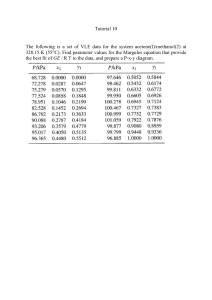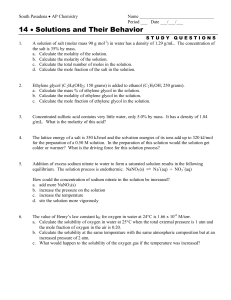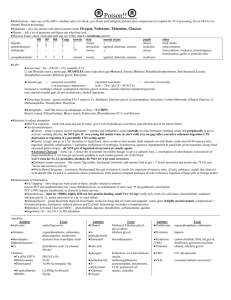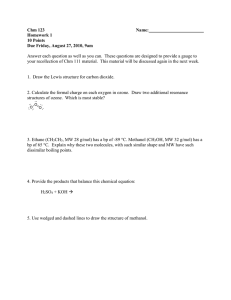Methane Emission Reduction: Glycol Dehydration vs. Methanol Injection
advertisement
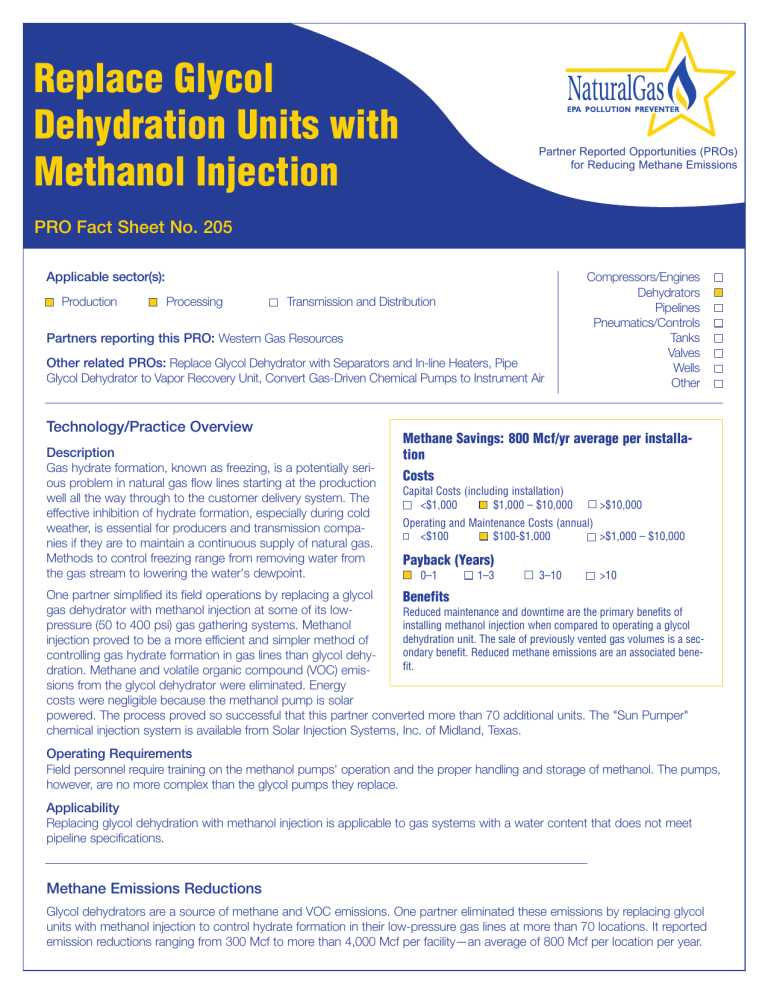
Replace Glycol Dehydration Units with Methanol Injection Partner Reported Opportunities (PROs) for Reducing Methane Emissions PRO Fact Sheet No. 205 Applicable sector(s): Production Processing Transmission and Distribution Partners reporting this PRO: Western Gas Resources Other related PROs: Replace Glycol Dehydrator with Separators and In-line Heaters, Pipe Glycol Dehydrator to Vapor Recovery Unit, Convert Gas-Driven Chemical Pumps to Instrument Air Technology/Practice Overview Description Gas hydrate formation, known as freezing, is a potentially serious problem in natural gas flow lines starting at the production well all the way through to the customer delivery system. The effective inhibition of hydrate formation, especially during cold weather, is essential for producers and transmission companies if they are to maintain a continuous supply of natural gas. Methods to control freezing range from removing water from the gas stream to lowering the water's dewpoint. Compressors/Engines Dehydrators Pipelines Pneumatics/Controls Tanks Valves Wells Other Methane Savings: 800 Mcf/yr average per installation Costs Capital Costs (including installation) <$1,000 $1,000 – $10,000 >$10,000 Operating and Maintenance Costs (annual) <$100 $100-$1,000 >$1,000 – $10,000 Payback (Years) 0–1 1–3 3–10 >10 One partner simplified its field operations by replacing a glycol Benefits gas dehydrator with methanol injection at some of its lowReduced maintenance and downtime are the primary benefits of pressure (50 to 400 psi) gas gathering systems. Methanol installing methanol injection when compared to operating a glycol dehydration unit. The sale of previously vented gas volumes is a secinjection proved to be a more efficient and simpler method of ondary benefit. Reduced methane emissions are an associated benecontrolling gas hydrate formation in gas lines than glycol dehyfit. dration. Methane and volatile organic compound (VOC) emissions from the glycol dehydrator were eliminated. Energy costs were negligible because the methanol pump is solar powered. The process proved so successful that this partner converted more than 70 additional units. The "Sun Pumper" chemical injection system is available from Solar Injection Systems, Inc. of Midland, Texas. Operating Requirements Field personnel require training on the methanol pumps' operation and the proper handling and storage of methanol. The pumps, however, are no more complex than the glycol pumps they replace. Applicability Replacing glycol dehydration with methanol injection is applicable to gas systems with a water content that does not meet pipeline specifications. Methane Emissions Reductions Glycol dehydrators are a source of methane and VOC emissions. One partner eliminated these emissions by replacing glycol units with methanol injection to control hydrate formation in their low-pressure gas lines at more than 70 locations. It reported emission reductions ranging from 300 Mcf to more than 4,000 Mcf per facility—an average of 800 Mcf per location per year. Economic Analysis Basis for Costs and Savings Additional income of $2,400 per year based on a reduction in vented emissions of 800 Mcf of gas with a nominal value of $3.00 per Mcf was realized. The cost of the methanol was offset by the elimination of the glycol expense. Discussion Payout is one year. The methanol injection and solar powered pump equipment can be installed for a capital cost of approximately $2,250 per installation. The systems were converted to reduce maintenance and operation expenses. Methanol costs are $3.45 per MMcf of gas throughput based on a treating ratio of 3 gallons of methanol per MMcf at a cost of $1.15 per gallon. The salvage value of the dehydration unit was not included in the payout determination. Last updated: January 2004
